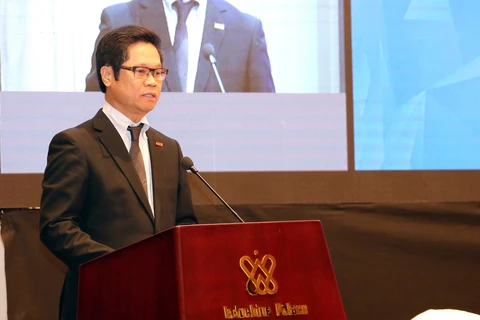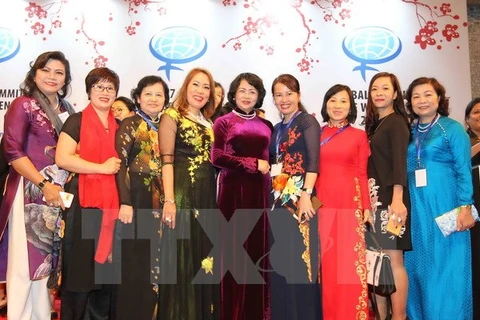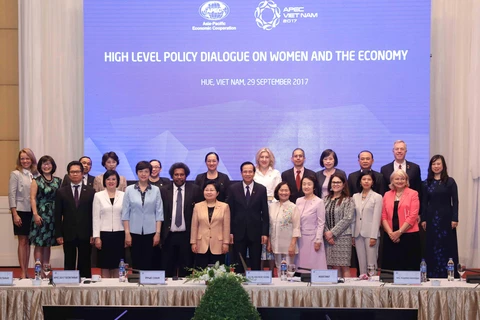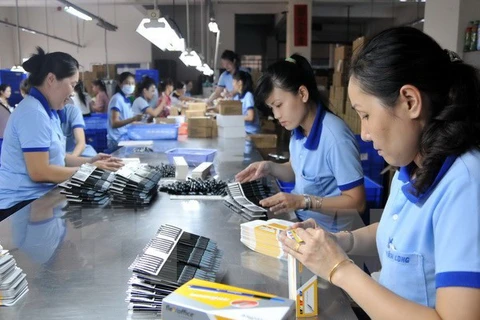Thua Thien-Hue (VNA) – Many delegates to the 2017 APEC Women and the Economy Forum in Vietnam’s central Hue city emphasised the need to eradicate biases against women and to empower them in order to boost development.
Speaking with reporters the forum’s sidelines, Lakshmi Puri, Assistant Secretary-General of the United Nations and Deputy Executive Director of UN Women, said the role of women in the household economy has traditionally been looked down in many societies.
“In rural areas, women work in the farms but are unpaid. They go and bring water where water is not provided on the tap. They bring fuel, they travel many miles to bring wood for burning in the stoves. There are so many aspects of work that women perform which is called unpaid care and domestic work which is valued at 16 trillion USD, but which has not been recognised. So that’s what really needs to change,” she emphasised.
She added that people need to recognise the work women do such as work in the home. They also need to recognise that women have a right to work in the productive sectors.
“I was very happy to hear today that Vietnam has many women in the private sector who are in leadership positions. But we really need all over the world as well as in Vietnam to reach a 50-50, a Planet 50-50 in terms of leadership and management,” Puri noted.
Speaking with reporters the forum’s sidelines, Lakshmi Puri, Assistant Secretary-General of the United Nations and Deputy Executive Director of UN Women, said the role of women in the household economy has traditionally been looked down in many societies.
“In rural areas, women work in the farms but are unpaid. They go and bring water where water is not provided on the tap. They bring fuel, they travel many miles to bring wood for burning in the stoves. There are so many aspects of work that women perform which is called unpaid care and domestic work which is valued at 16 trillion USD, but which has not been recognised. So that’s what really needs to change,” she emphasised.
She added that people need to recognise the work women do such as work in the home. They also need to recognise that women have a right to work in the productive sectors.
“I was very happy to hear today that Vietnam has many women in the private sector who are in leadership positions. But we really need all over the world as well as in Vietnam to reach a 50-50, a Planet 50-50 in terms of leadership and management,” Puri noted.
[High-level dialogue suggests policies on women’s empowerment]
Echoing the view, Australian Ambassador for Women and Girls Sharman Stone said if women do not participate shoulder to shoulder with men as equal as in leadership and economic empowerment, countries will not grow economically because “we are missing on half of the population, innovation, energy and work capacity.”
According to the ambassador, it is ideal to have at least 50 percent of representatives in parliaments being women. It’s a goal, a strategy that hasn’t been achieved yet. No country in the Pacific region has achieved that yet.
“But I think it would be the outcome for the 21st century, later in our century,” she noted.
“Women are not super human. We cannot have women doing everything. So men will need to convince that they should also share in parenting. Men are brilliant fathers, just like women are brilliant mothers.”
The ambassador said if women go into business, men should support them in their families. Women should be in the army, the air force and the police. They should also be captains of industry, running micro and big businesses.
“There’s nothing that women can’t do, there is nothing men can’t do,” she said, adding that the APEC region should strive to have women to have equal opportunity, both at home and at work.
Rhodora T. Masilang-Bucoy, Chairperson of the Philippine Commission on Women, said if women are still tied to the home, to their care work and not productive work, this is a very significant loss in terms of productive resources.
She said: “It is very important to give them voice, make them participate in the decision making, then governments provide them enabling mechanisms such as market, finance, logistics, and of course, access to uncontrolled resources.”
“Women, because of our nurturing characteristic, because of our patience, because of our hard work, because of our very important role in the survival of the families, we have these characteristics and creativity that we need to empower our society and help improve our economy.”
Bucoy also pointed out that there are still a lot of culture, stereotype and biases among men that makes them not see the important role of women. She noted: “We have to change attitude of men so that they will look at women as a very important partner in development.”
The 2017 APEC Women and the Economy Forum was held in Hue city, Thua Thien-Hue province, from September 26 to 29 under the theme “enhancing women’s inclusion and economic empowerment in a changing world”. It was part of a series of events hosted by Vietnam during the APEC Year 2017.-VNA
Echoing the view, Australian Ambassador for Women and Girls Sharman Stone said if women do not participate shoulder to shoulder with men as equal as in leadership and economic empowerment, countries will not grow economically because “we are missing on half of the population, innovation, energy and work capacity.”
According to the ambassador, it is ideal to have at least 50 percent of representatives in parliaments being women. It’s a goal, a strategy that hasn’t been achieved yet. No country in the Pacific region has achieved that yet.
“But I think it would be the outcome for the 21st century, later in our century,” she noted.
“Women are not super human. We cannot have women doing everything. So men will need to convince that they should also share in parenting. Men are brilliant fathers, just like women are brilliant mothers.”
The ambassador said if women go into business, men should support them in their families. Women should be in the army, the air force and the police. They should also be captains of industry, running micro and big businesses.
“There’s nothing that women can’t do, there is nothing men can’t do,” she said, adding that the APEC region should strive to have women to have equal opportunity, both at home and at work.
Rhodora T. Masilang-Bucoy, Chairperson of the Philippine Commission on Women, said if women are still tied to the home, to their care work and not productive work, this is a very significant loss in terms of productive resources.
She said: “It is very important to give them voice, make them participate in the decision making, then governments provide them enabling mechanisms such as market, finance, logistics, and of course, access to uncontrolled resources.”
“Women, because of our nurturing characteristic, because of our patience, because of our hard work, because of our very important role in the survival of the families, we have these characteristics and creativity that we need to empower our society and help improve our economy.”
Bucoy also pointed out that there are still a lot of culture, stereotype and biases among men that makes them not see the important role of women. She noted: “We have to change attitude of men so that they will look at women as a very important partner in development.”
The 2017 APEC Women and the Economy Forum was held in Hue city, Thua Thien-Hue province, from September 26 to 29 under the theme “enhancing women’s inclusion and economic empowerment in a changing world”. It was part of a series of events hosted by Vietnam during the APEC Year 2017.-VNA
VNA
























